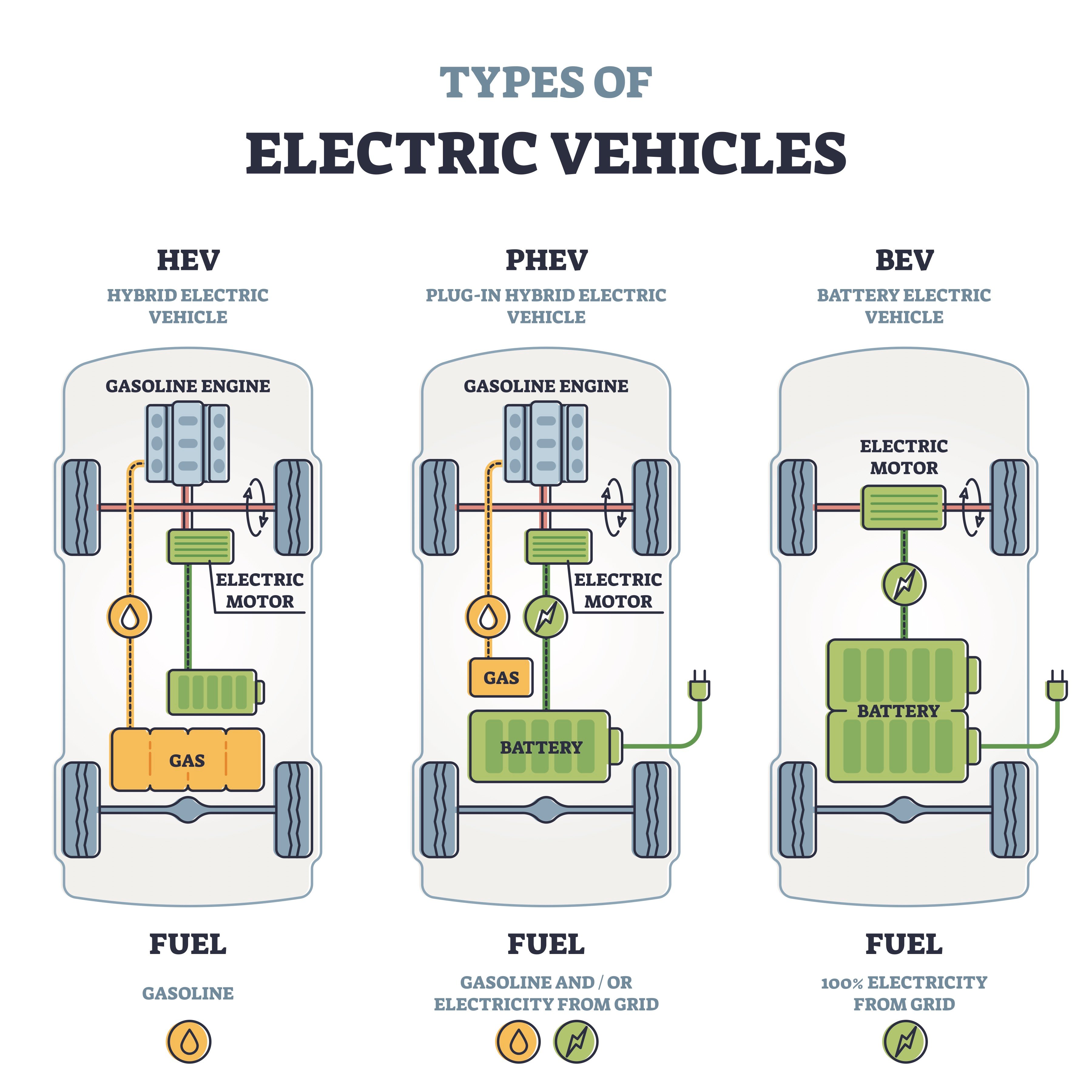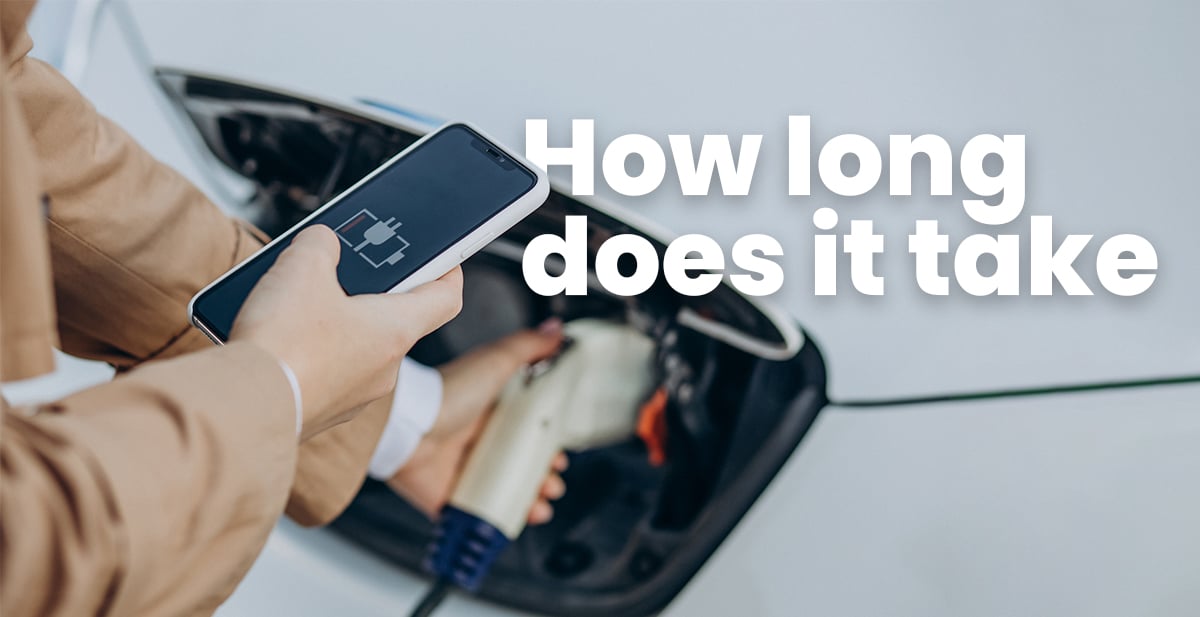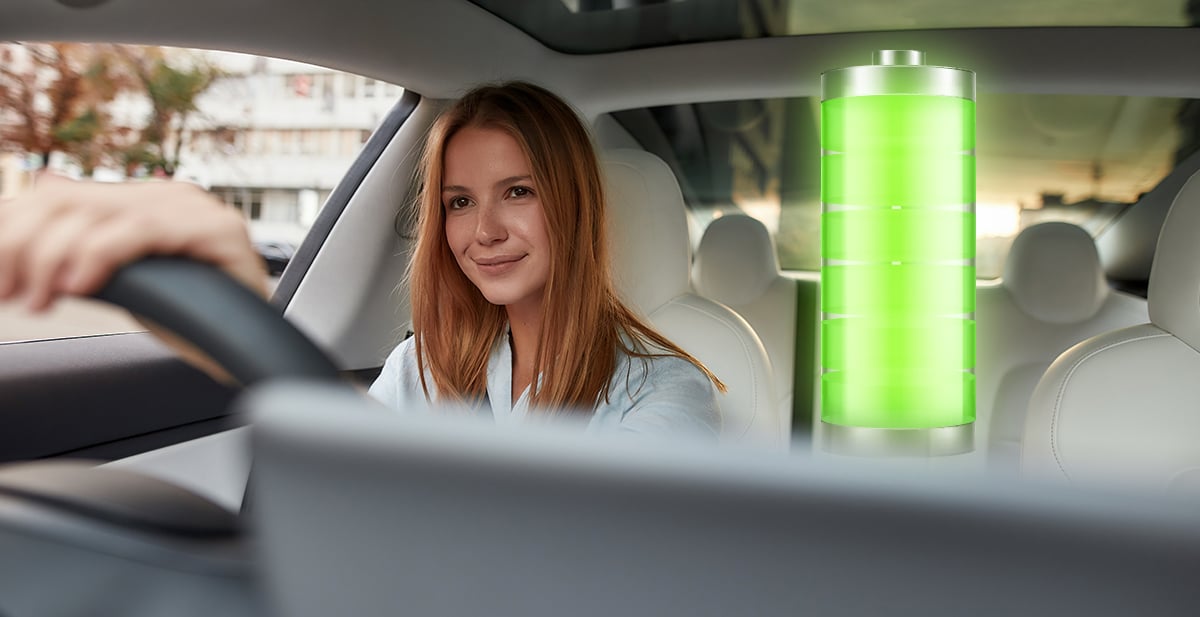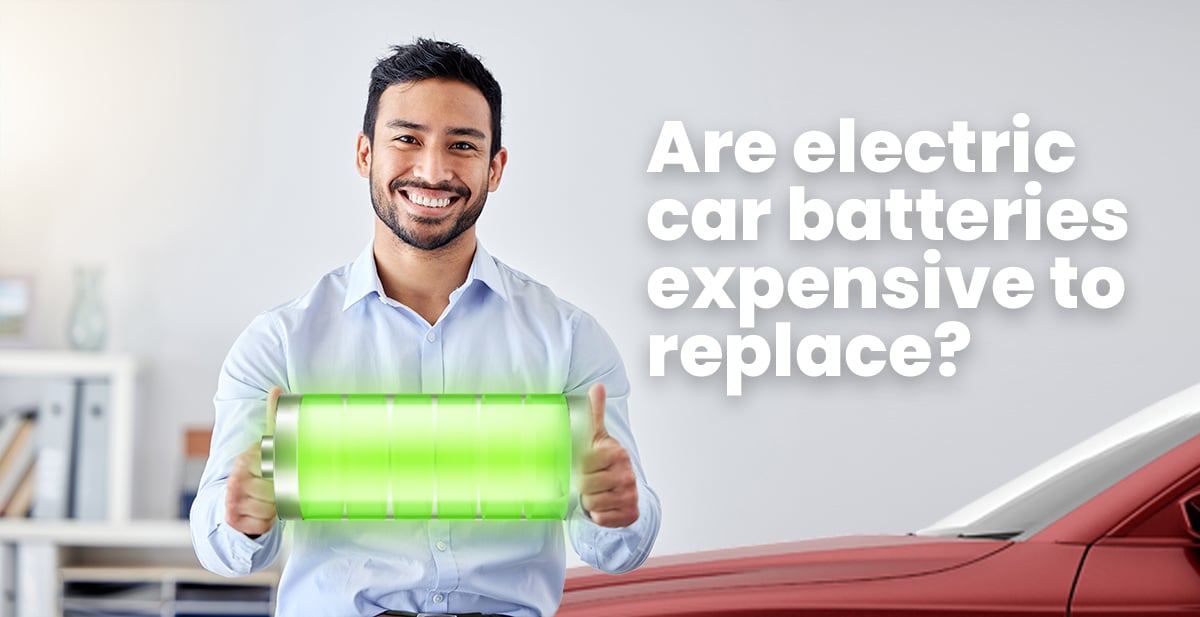Share this
Your Guide to Electric Cars (HEV, PHEV and BEV)
by Chris Hopkins on Jan 5, 2023 11:10:58 AM
Electric cars are becoming increasingly popular as a more environmentally-friendly alternative to traditional gasoline-powered vehicles. With so many new brands and models hitting the Australian EV car market in 2023 we thought it appropriate to provide a quick explanation of the different types of EV as there are three different types of electric car, each with its own unique features and characteristics.
What Is an Electric Car?
.png?width=800&height=420&name=Blog%20images%20(3).png)
Much of the hesitation comes from a lack of understanding of what an electric car, or EV, really is. Many of us think of the early models that struggled to make it ten minutes down the road before running out of power. But they have come a long way in recent years.
Traditionally, cars use fossil fuels—petrol or diesel—to run. Gas-powered vehicles use an internal combustion engine.
An electric car is an electric vehicle solely powered by electric motors. They are quieter than their gas-powered counterparts, emit no exhaust, and lower emissions overall. Electric cars are the answer in the quest to make the planet green. You can even get electric-powered caravans!
How Does It Work?
Put simply, electric cars plug into a charging point and take electricity from the grid. They store the electricity in rechargeable batteries that power the motor. Just as you recharge your phone or laptop, EVs need recharging. The motor makes the wheels turn and accelerate more quickly.
You don’t have to plug in at a gas station charging point. You can easily plug your car in at home, essentially negating any running costs.
While electric rechargeable batteries are heavier than anything you’ll find in a standard car, EVs feel lighter to drive.
Is It Cheaper to Maintain an EV?

While upfront costs of an EV might be higher than you would pay for a regular car, you’ll make your money back in the long term. Just as with gas-powered vehicles, the cost to maintain varies depending on the make and model. However, unlike gas-powered cars, EV running costs are less likely to break the bank.
Firstly, electricity costs far less than petrol or diesel. This is a particular concern at the moment with rising gas prices globally. It would cost you somewhere between $10 - $50 to fully charge your EV (as with regular cars, the larger the vehicle, the more expensive each recharge). In comparison, diesel and petrol cost about $1.80. Filling a 50-litre tank would cost $90—and this is a small tank.
Moreover, you can charge your EV at home. If you’re only making short journeys around town, there’s no reason you’ll ever need to pay full price for electricity at a charging point.
Secondly, EV batteries and internal components require far less maintenance than a standard car’s combustion engine. If you want to cut down on a few costly trips to the garage, buying an EV is worth it.
Pros and Cons

On the whole, EVs come out on top. While gas-powered cars might be convenient in the short term, an EV will last you many more years and save you thousands of dollars. Plus, as EVs grow in popularity, models will improve. Technology is continuously improving. Even ten years ago, we couldn’t have imagined the current top of the range EVs, such as the Tesla Model 3.
Where Can I Charge My EV? And How Much Does it Cost?
One of the biggest concerns many Australians have is about where you can charge your EV. The stereotype is that an electric car will run out of power too quickly to be of any use. While it’s true that the average EV needs charging more often than normal cars need refilling with gas, it’s not as bad as many people think.
The key is to plug it in at home and work. If you mainly use your car for commuting or driving around town, overnight charges should be plenty. Remember that charging an EV could take half an hour or more, so always try to do it before travelling. Moreover, many supermarkets have EV charging points—topping up your EV while in the shop is an excellent time-saver.
However, if you’re on a long journey and need to fill up, there are many charging points in gas stations, parking lots, and shops. The average charging station will cost $0.20 - $0.25 per kWh. Plus, various apps and websites locate all your nearby charging points, with up to date comments from other drivers about whether or not they are working.

HEV (Hybrid Electric Vehicle)
HEV (Hybrid Electric Vehicle) is a type of electric car that combines a traditional gasoline engine with an electric motor. HEVs use the electric motor for low-speed driving and the gasoline engine for higher speeds and longer trips. The advantage of an HEV is that it can operate using either the electric motor or the gasoline engine, depending on the driving conditions. This allows HEVs to have a longer driving range than pure electric vehicles (EVs).
PHEV (Plug-in Hybrid Electric Vehicle)
PHEV (Plug-in Hybrid Electric Vehicle) is another type of electric car that combines a traditional gasoline engine with an electric motor. Like an HEV, a PHEV can operate using either an electric motor or a gasoline engine, depending on the driving conditions. The difference is that a PHEV has a larger battery pack and can be plugged in to charge the battery. This allows PHEVs to drive longer distances using only electricity, making them more environmentally friendly than HEVs.
One of the most popular and affordable PHEV vehicles currently available in Australia is the 2022 MG HS Plus EV Excite 1.5L SUV FWD Hybrid which retails from $46,990.
BEV (Battery Electric Vehicle)
BEV (Battery Electric Vehicle) is a type of electric car that is powered solely by an electric motor and a battery pack. BEVs do not have a traditional gasoline engine and must be plugged in to charge the battery. The advantage of a BEV is that it produces zero emissions and is completely reliant on electricity for power. However, BEVs have a shorter driving range than HEVs and PHEVs, and may require more frequent charging,
The car future in Australia is electric and while Carsales ranks the Tesla 3 as the best electric car in the market today it comes with a hefty price tag ranging in price from $65,500 - $93,605 for the 2022 model.
Pricing
You could spend anywhere from $40,000 to over $200,000 for an electric car in Australia. The reason EVs are more expensive is because manufacturers had to spend a fortune researching the technology. In the early days, they were costly to make. As with anything new, prices are higher. Therefore, the industry wants a return on its investment sooner rather than later.
As more and more customers switch to electric cars, the demand will drive the price down. However, they’re still comparatively much more expensive than gas-powered vehicles at the moment.
The cheapest EV for sale in Australia is the GWM Ora which is currently available from $35,990.
However, with a car finance broker on your side, you can find an affordable plan to purchase your EV without making mistakes on your car loan.
Additionally, as capable electric cars have been around for over 20 years now, plenty of used vehicles are available for a fraction of the cost.
There are, however, a growing number of cheaper EV alternatives that are gaining popularity with Australian consumers.
Are you ready to go electric? At Ausloans we have over 40 lenders and can find the perfect finance deal to fuel your electric car dream.
Will buying an electric vehicle save you money?
The short answer is yes, an electric vehicle (EV) can save you money in the long run compared to a petrol-powered vehicle. While the initial cost of an EV may be higher than a petrol-powered vehicle, EVs are cheaper to operate because they are more efficient and have lower fuel costs.
One of the main cost savings of an EV is its lower fuel costs. Electricity is generally cheaper than gasoline, so fueling an EV will typically cost less than filling up a gas-powered vehicle. Additionally, EVs are more efficient than gas-powered vehicles, so they can go further on a single charge, which can save you money on fuel costs over time.
Are EV's easier to service?
Yes, electric cars are generally easier to service and more cost-effective to own compared to gas-powered cars. One of the reasons for this is that electric cars have fewer moving parts than gas-powered cars, which means there are fewer parts that can wear out or break down. This makes electric cars less likely to need expensive repairs and makes them easier to service.
Additionally, electric cars are generally simpler to maintain because they don't require regular oil changes and other maintenance tasks that are necessary for gas-powered cars. This can save you time and money on regular maintenance, and make electric cars more convenient to own.
Another way that an EV can save you money is through government incentives and tax breaks. In many places, EVs are eligible for tax credits and rebates, which can help offset the initial cost of purchasing an EV. Additionally, some cities and states offer reduced rates for EV charging and other perks, such as access to carpool lanes, which can save you money on fuel and tolls.
EV Car Depreciation

Another benefit of electric cars is that they tend to depreciate at a slower rate than gas-powered cars. Depreciation is the decline in value of a vehicle over time, and it is a significant cost for car owners.
Studies have shown that electric cars tend to retain their value better than gas-powered cars because they are in high demand and have a longer lifespan. The battery packs in electric cars are also designed to last for many years, which can further increase their resale value.
This means that when you decide to sell your electric car, you are likely to get a higher price for it than you would for a gas-powered car of the same age and condition. This can save you money and offset some of the initial cost of purchasing an electric car.
Overall, electric cars are not only cheaper to operate and maintain, but they also tend to depreciate at a slower rate than gas-powered cars. This makes them a more cost-effective option for many car buyers.
EV FAQS
How long does it take to charge an EV?

It typically takes anywhere from 30 minutes to 12 hours to charge an electric vehicle (EV), depending on the size of the battery and the speed of the charging station. The exact time it takes to charge an EV can vary, so it's best to consult the owner's manual or the manufacturer of your vehicle for specific information.
A Level 1 EV charging cable uses a standard household electrical outlet to charge an electric vehicle (EV). Level 1 charging cables use a low-voltage alternating current (AC) electrical connection to charge the battery, which allows them to charge an EV in 8-12 hours or more. This makes them the slowest type of EV charging station, but they are also the most widely available and the least expensive to use.
Most EVs come with a standard Level 1 charging cable that can be plugged into a household outlet, allowing you to easily charge your EV at home or at any other location that has a standard outlet. While Level 1 charging stations may not be the best option if you need to quickly recharge your EV, they can be a convenient and affordable way to recharge your EV overnight from the comfort of your home.
If you want to charge your EV more quickly, you can use a Level 2 charging station. A Level 2 EV charging station is a type of public charging station that can charge an electric vehicle (EV) in a shorter time than a standard Level 1 charging station.
Level 2 charging stations use a higher-voltage alternating current (AC) electrical connection to charge the battery, which allows them to charge an EV in as little as four hours or less. This makes them a good option for drivers who want to recharge their EV more quickly than with a Level 1 charging station, but don't need the fastest possible charging speed of a Level 3 charging station.
Level 2 charging stations are often available at public places like shopping malls, parking garages, and hotels, and many of them can be used with a standard EV charging cable.
A Level 3 EV charging station, also known as a DC fast charger, is a type of public charging station that can charge an electric vehicle (EV) in a much shorter time than a standard Level 1 or Level 2 charging station.
Level 3 charging stations use a high-voltage direct current (DC) electrical connection to charge the battery, which allows them to charge an EV in as little as 30 minutes or less. This makes them ideal for drivers who need to quickly recharge their EV, such as when they are on a long road trip and don't have time to wait for a slower charging station.
Level 3 charging stations are typically more expensive to use than Level 1 or Level 2 charging stations, but they offer the convenience of a faster charging time. Some newer EVs come with a Level 3 charging option built-in, but many older models will require the use of an adapter to use a Level 3 charging station.
What factors affect EV charging speed?
Size of the battery:

The size of an EV's battery can also affect the charging speed. In general, larger batteries take longer to charge than smaller batteries. For example, a small EV with a battery capacity of 24 kWh may be able to fully charge in 6-8 hours using a Level 2 charging station, while a larger EV with a battery capacity of 100 kWh may take 10-12 hours or more to charge using the same charging station.
The temperature of the battery
The temperature of an EV's battery can also affect its charging speed. In general, colder temperatures can reduce the charging speed, while warmer temperatures can increase the charging speed. For example, an EV's battery may charge more slowly in cold weather than in warm weather. It's important to follow the manufacturer's recommendations for charging your EV in different temperature conditions to ensure optimal charging speed and battery performance.
Can I recharge my EV battery while driving?
How long will an electric car battery last?

The lifespan of an electric car battery depends on a number of factors, including the type of battery, the age of the car, and how the car is used and maintained. On average, electric car batteries are designed to last for around eight to ten years or up to 150,000 to 200,000 miles, depending on the type of battery and how it is used.
However, the actual lifespan of an electric car battery can vary greatly depending on a number of factors. For example, the type of battery used in the car can affect its lifespan. Lithium-ion batteries, which are commonly used in electric cars, are generally considered to be more durable and long-lasting than other types of batteries.
Additionally, the age of the car and how it is used and maintained can also affect the lifespan of the battery. Electric cars that are well-maintained and not used extensively may have longer battery lifespans than those that are not well-maintained or are used frequently.
Overall, the lifespan of an electric car battery can vary greatly depending on a number of factors. On average, electric car batteries are designed to last for around eight to ten years or up to 150,000 to 200,000 miles. However, the actual lifespan may be longer or shorter depending on how the car is used and maintained.
Are electric car batteries expensive to replace?

Electric car batteries can be expensive to replace. The cost of replacing an electric car battery depends on a number of factors, including the type of battery, the age of the car, and the manufacturer. On average, the cost of replacing an electric car battery can range from around $3,000 to $8,000, depending on these factors.
The type of battery used in the electric car can affect the cost of replacing it. Lithium-ion batteries, which are commonly used in electric cars, are generally more expensive to replace than other types of batteries. Additionally, the age of the car and the manufacturer can also affect the cost of replacing the battery.
However, the cost of replacing an electric car battery may be offset by the savings on fuel costs and maintenance. Electric cars are generally more efficient than gas-powered cars, which means they use less energy to go the same distance. This can save you money on fuel costs over time, which can offset the cost of replacing the battery.
Overall, electric car batteries can be expensive to replace. The cost of replacing a battery can range from around $3,000 to $8,000, depending on the type of battery, the age of the car, and the manufacturer. However, the savings on fuel costs and maintenance may offset some of these costs.
So it is worth switching to an EV? The future outlook for electric Vehicles in Australia is bright and with a host of new Government subsidies being introduced to help make the switch to an EV more affordable, maybe it's time to make the change.
In conclusion, the electric vehicle (EV) market is rapidly evolving, and the future of transportation in Australia is undoubtedly electric. With various types of EVs available—HEVs, PHEVs, and BEVs—drivers have options to suit their individual needs and preferences. While the initial purchase cost may be higher than traditional gasoline-powered cars, the long-term savings on fuel, maintenance, and potential government incentives make EVs a more economical and environmentally friendly choice. As technology continues to advance and charging infrastructure expands, electric vehicles are becoming a more viable and attractive option for everyday Australians. With the growing number of models, competitive pricing, and the increasing availability of used EVs, there has never been a better time to consider making the switch to electric driving.
Share this
- Car Loans (34)
- Car loan (12)
- Cars (9)
- EV (8)
- Electric Cars (7)
- Personal Loan (6)
- business loan (5)
- hybrid cars (5)
- Car Finance (4)
- EOFY (4)
- bad credit (4)
- caravan finance (4)
- chattel mortgage (4)
- car prices (3)
- interest rates (3)
- Holiday (2)
- credit score (2)
- family cars (2)
- summer (2)
- Caravan Loan (1)
- Caravan Loans (1)
- Equipment Loans (1)
- Future (1)
- Marine Finance (1)
- Tradies (1)
- car broker (1)
- caravan (1)
- caravan and camper sales (1)
- caravan parks (1)
- consumer finance (1)
- finance (1)
- finance approval (1)
- jet ski (1)
- new car (1)
- payday loans (1)
- April 2024 (4)
- March 2024 (6)
- February 2024 (5)
- January 2024 (3)
- December 2023 (6)
- November 2023 (7)
- October 2023 (5)
- September 2023 (6)
- August 2023 (4)
- July 2023 (5)
- June 2023 (2)
- February 2023 (1)
- January 2023 (4)
- December 2022 (4)
- November 2022 (1)
- October 2022 (5)
- September 2022 (1)
- July 2022 (4)
- June 2022 (3)
- May 2022 (3)
- April 2022 (2)
- March 2022 (3)
- February 2022 (4)
- January 2022 (2)
- December 2021 (1)
- November 2021 (3)
- October 2021 (3)
- September 2021 (7)
- August 2021 (4)

/Ausloans%20home/logos/Ausloans_logo_black.png?width=180&height=94&name=Ausloans_logo_black.png)
Comments (9)